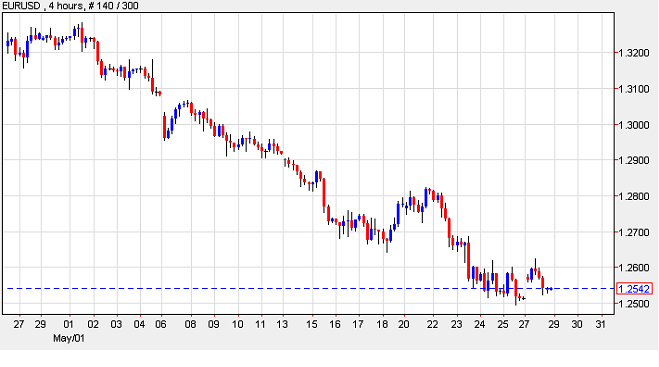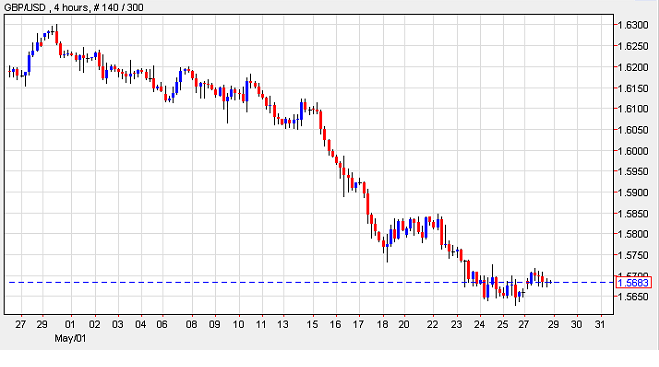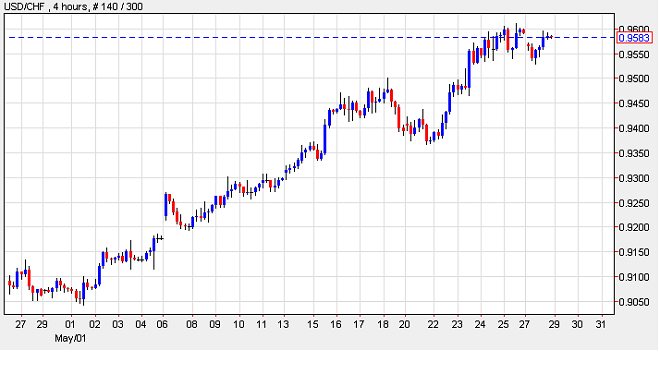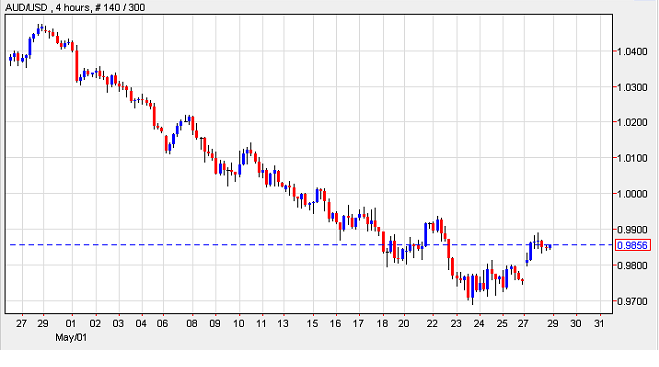Who is Kevin Hassett? Wolfe looks at the Trump ally tipped to become Fed Chair.
The U.S. dollar weakened against the majority of its peers as Greek political parties favoring the bailout measures gained in the polls, thereby offering a glimmer of hope that Greece may not exit the eurozone. Trading was somewhat subdued as the U.S. markets were closed on account of Memorial Day. However, sentiment remained under pressure as investors continue to worry over the outcome of June’s elections and the welfare of Spain’s banking institutions. The U.S. currency traded broadly lower against the commodity-related currencies such as the Australian, New Zealand and Canadian dollars. The US Dollar Index declined for the first time in five days as demand for high-yield assets boosted equities.
The euro rebounded after having reached the lowest price since July 2010 against the U.S. dollar as polls in Greece revealed that the pro-bailout parties were making gains. Spain announced its intentions to assist the Bankia group on Sunday, spurring concern that a hike in bank borrowing costs could prompt Madrid to ask for an additional bailout. In the meantime, 10-year Spanish government bonds rose to 6.5 percent, fueling even more fears amid market investors. The pound also traded somewhat high against the greenback on hopes that Greece may not have to exit the euro monetary region. However, fears over Spain’s crisis capped the Sterling’s gains. The British currency continued to rally against the U.S. dollar after reports indicated that Greek pro-bailout parties were leading in the polls while the New Democracy Party may form a coalition government following June’s elections. Trading during the European session was light since many European markets were also closed on Monday.
The U.S. dollar slipped versus the yen as the Bank of Japan’s most recent monetary policy meeting minutes were published. The minutes revealed that policy makers came to a consensus on a number of issues in order to ensure that the country’s economy continues to recover. However, they also showed that the BOJ will have to change investor opinion, as many seem to be under the impression that the bank will implement further easing until the 1 percent inflation target is achieved.
Lastly, the South Pacific currencies advanced against the U.S. dollar on the prospect that Greece will not have to leave the eurozone. The kiwi strengthened against all of its counterparts as it appeared that its decline happened too fast. Both monetary units rallied after Asian stocks gained.
EUR/USD- Pro-Bailout Parties Gain
The euro gained against the U.S. dollar as sentiment firmed up following the release of a weekend poll which showed that the Greek pro-bailout party, New Democracy is gaining, and may be able to form a government following the June 17 elections. But concerns over the increase in Spain’s borrowing costs limited the euro’s recovery. Meanwhile, Spain’s Treasury reached its goals and auctioned 3.5 billion euros of 2-year bonds even as the yields rose to 4.3 percent.
 EUR/USD" title="EUR/USD" width="659" height="367" />
EUR/USD" title="EUR/USD" width="659" height="367" />
GBP/USD- Sterling Erases Gains
The British pound gained against the U.S. dollar on hopes Greece may not have to exit the euro bloc. However, it erased early gains and weakened against 13 of its 16 peers on speculation that this week’s economic data will confirm that Consumer Confidence and Manufacturing activity declined in the U.K. This, according to analysts, will prove that the country’s economic recovery is faltering. Furthermore, economists believe that although the sterling posted consistent gains, it’s now beginning to slip as the economy faces a reality check. And while market investors were set at ease over the possibility of Greece’s exit from the euro bloc, Lloyd’s of London began preparations for what the bank believes will be the demise of the euro if Greece does leave the euro monetary zone.
 GBP/USD" title="GBP/USD" width="659" height="367" />
GBP/USD" title="GBP/USD" width="659" height="367" />
USD/CHF- Greenback Slips
The U.S. dollar slipped further against the Swiss franc as investors felt optimistic Greece may not have to depart from the eurozone. The dollar’s losses were limited on uncertainty over the outcome of June’s elections and fears over the banking crisis in Spain. The Franc declined versus the euro as it was reported that pro-bailout parties advanced in the Greek opinion polls, reducing demand for the safety of the franc. The currency continued to dip to the downside after the central bank’s President, Thomas Jordan stated that the bank may consider controlling capital inflows to maintain the value of the Swiss currency low.
 USD/CHF" title="USD/CHF" width="659" height="367" />
USD/CHF" title="USD/CHF" width="659" height="367" />
AUD/USD- Aussie Halts Weeks Of Declines
The Australian dollar gained against the U.S. currency on hopes Greece won’t have to exit the euro monetary bloc. The aussie traded at the highest level in close to one week following news that Greece’s New Democracy Party led in the polls taken this past weekend. However, the currency’s gains were limited as a previously issued report showed that China’s industrial sector declined in the month of April, dampening the outlook for the country’s exports.
 AUD/USD" title="AUD/USD" width="659" height="367" />
AUD/USD" title="AUD/USD" width="659" height="367" />
Today’s Outlook
Today’s economic calendar shows that the U.K. will release the CBI Distributive Trades Survey. The E.U. will report on German CPI and the Import Price Index. The U.S. will release data on CB Consumer Confidence. New Zealand will issue Building Consents. And Australia will post Retail Sales.
The euro rebounded after having reached the lowest price since July 2010 against the U.S. dollar as polls in Greece revealed that the pro-bailout parties were making gains. Spain announced its intentions to assist the Bankia group on Sunday, spurring concern that a hike in bank borrowing costs could prompt Madrid to ask for an additional bailout. In the meantime, 10-year Spanish government bonds rose to 6.5 percent, fueling even more fears amid market investors. The pound also traded somewhat high against the greenback on hopes that Greece may not have to exit the euro monetary region. However, fears over Spain’s crisis capped the Sterling’s gains. The British currency continued to rally against the U.S. dollar after reports indicated that Greek pro-bailout parties were leading in the polls while the New Democracy Party may form a coalition government following June’s elections. Trading during the European session was light since many European markets were also closed on Monday.
The U.S. dollar slipped versus the yen as the Bank of Japan’s most recent monetary policy meeting minutes were published. The minutes revealed that policy makers came to a consensus on a number of issues in order to ensure that the country’s economy continues to recover. However, they also showed that the BOJ will have to change investor opinion, as many seem to be under the impression that the bank will implement further easing until the 1 percent inflation target is achieved.
Lastly, the South Pacific currencies advanced against the U.S. dollar on the prospect that Greece will not have to leave the eurozone. The kiwi strengthened against all of its counterparts as it appeared that its decline happened too fast. Both monetary units rallied after Asian stocks gained.
EUR/USD- Pro-Bailout Parties Gain
The euro gained against the U.S. dollar as sentiment firmed up following the release of a weekend poll which showed that the Greek pro-bailout party, New Democracy is gaining, and may be able to form a government following the June 17 elections. But concerns over the increase in Spain’s borrowing costs limited the euro’s recovery. Meanwhile, Spain’s Treasury reached its goals and auctioned 3.5 billion euros of 2-year bonds even as the yields rose to 4.3 percent.
 EUR/USD" title="EUR/USD" width="659" height="367" />
EUR/USD" title="EUR/USD" width="659" height="367" />GBP/USD- Sterling Erases Gains
The British pound gained against the U.S. dollar on hopes Greece may not have to exit the euro bloc. However, it erased early gains and weakened against 13 of its 16 peers on speculation that this week’s economic data will confirm that Consumer Confidence and Manufacturing activity declined in the U.K. This, according to analysts, will prove that the country’s economic recovery is faltering. Furthermore, economists believe that although the sterling posted consistent gains, it’s now beginning to slip as the economy faces a reality check. And while market investors were set at ease over the possibility of Greece’s exit from the euro bloc, Lloyd’s of London began preparations for what the bank believes will be the demise of the euro if Greece does leave the euro monetary zone.
 GBP/USD" title="GBP/USD" width="659" height="367" />
GBP/USD" title="GBP/USD" width="659" height="367" />USD/CHF- Greenback Slips
The U.S. dollar slipped further against the Swiss franc as investors felt optimistic Greece may not have to depart from the eurozone. The dollar’s losses were limited on uncertainty over the outcome of June’s elections and fears over the banking crisis in Spain. The Franc declined versus the euro as it was reported that pro-bailout parties advanced in the Greek opinion polls, reducing demand for the safety of the franc. The currency continued to dip to the downside after the central bank’s President, Thomas Jordan stated that the bank may consider controlling capital inflows to maintain the value of the Swiss currency low.
 USD/CHF" title="USD/CHF" width="659" height="367" />
USD/CHF" title="USD/CHF" width="659" height="367" />AUD/USD- Aussie Halts Weeks Of Declines
The Australian dollar gained against the U.S. currency on hopes Greece won’t have to exit the euro monetary bloc. The aussie traded at the highest level in close to one week following news that Greece’s New Democracy Party led in the polls taken this past weekend. However, the currency’s gains were limited as a previously issued report showed that China’s industrial sector declined in the month of April, dampening the outlook for the country’s exports.
 AUD/USD" title="AUD/USD" width="659" height="367" />
AUD/USD" title="AUD/USD" width="659" height="367" />Today’s Outlook
Today’s economic calendar shows that the U.K. will release the CBI Distributive Trades Survey. The E.U. will report on German CPI and the Import Price Index. The U.S. will release data on CB Consumer Confidence. New Zealand will issue Building Consents. And Australia will post Retail Sales.
